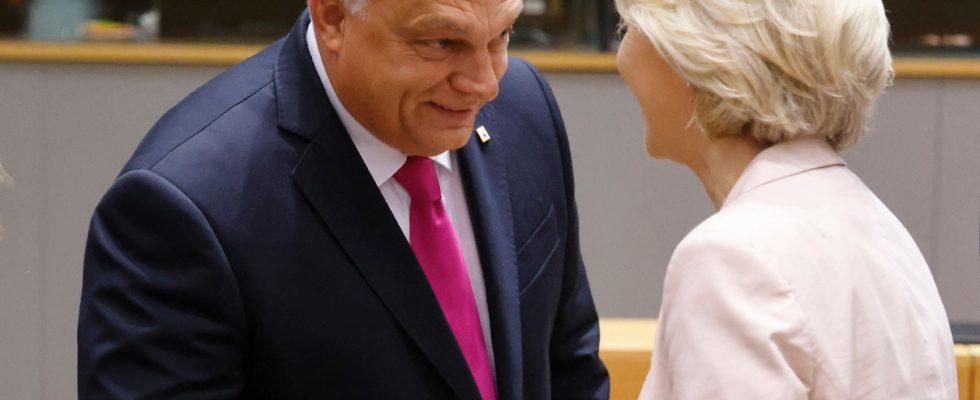“Warn your spouses that the European summit will last until Sunday,” advises a senior Brussels official whose features are already drawn. The sentence may well be said as a joke, but it reflects the uncertainty surrounding the outcome of the crucial meeting which opens this Thursday, December 14 in the European capital. For their last meeting of the year, the 27 heads of state and government must take decisions eagerly awaited by Ukraine, but the sword of Damocles of a Hungarian veto still threatens to derail everything.
However, the stakes are significant for the European Union: it is a question of showing lasting support for the Ukrainians, weakened in their counter-offensive and worried about the risks of fatigue among their Western allies. “The whole world will have its eyes fixed on us. Failure would be a very hard blow,” admits a high-ranking diplomat. The Europeans are supposed to validate funding of 50 billion euros for the Ukrainian state over four years, they must also release several billion for weapons and at the same time symbolically open the door to the Union by giving the green light to the launch of accession negotiations. “It is about the security of the continent and its stability, it is also about sending a very strong signal to Russia,” warns Minister of European Affairs Laurence Boone.
On the eve of the leaders’ arrival in Brussels, Hungary has finally lifted the veil on what it demands to lift its veto on financial aid to Ukraine. Budapest wants payment of all the European funds intended for it but frozen for non-compliance with the rule of law – some 22 billion euros in total. The European Commission has released in extremis 10.2 billion euros this Wednesday, December 13, highlighting progress on the independence of the judiciary.
The Hungarian Prime Minister and his entourage, however, continue to refuse the principle of opening accession negotiations. “The European Union is preparing to make a terrible mistake, and this must be avoided,” Viktor Orban insisted in an interview with a Hungarian site, fueling fears of an unprecedented blockage. The Ukrainian president made no mistake, having already pleaded his case to the strong man of Budapest during a short exchange in Argentina on Sunday December 10. Volodymyr Zelensky could also stop in Brussels on his way back from the United States.
“It’s quite rare that we see things so unclearly,” admitted a high-ranking diplomat a few days ago. In Brussels, the preparatory meetings took place at a frantic pace, one of them lasting more than 15 hours on Sunday December 10. The capitals are working on ways to bypass Hungary via a plan B of 26; and must also at the same time move forward on the substance of the issues on the meeting’s agenda.
Here too, it’s not necessarily simple. The Commission has requested a review of the multiannual European budget which includes aid to Ukraine but also funds for migration or industrial policy. The “frugal” countries of northern Europe or Germany, hampered by the judgment of the Constitutional Court of Karlsruhe which limits its budgetary room for maneuver, are slamming on the brakes. In normal times, financial negotiations between the 27 are already considered among the most difficult… And we also need to agree on common messages concerning the conflict in the Middle East or European defense policy.
“Money questions, unanimous decisions, crucial and historic, this will inevitably last a little long”, euphemizes a European source. Europe is accustomed to these laborious summits, which end up culminating in the wee hours of the night. In at least 26 capitals, we reassure ourselves that this classic scenario will happen again. “Viktor Orban is lucky to have the type of democracy that allows him to change his mind on Thursday evening,” quips an ambassador who wants to be optimistic. In any case, the Budapest strongman has already partly achieved what he wanted: he is the center of attention.
